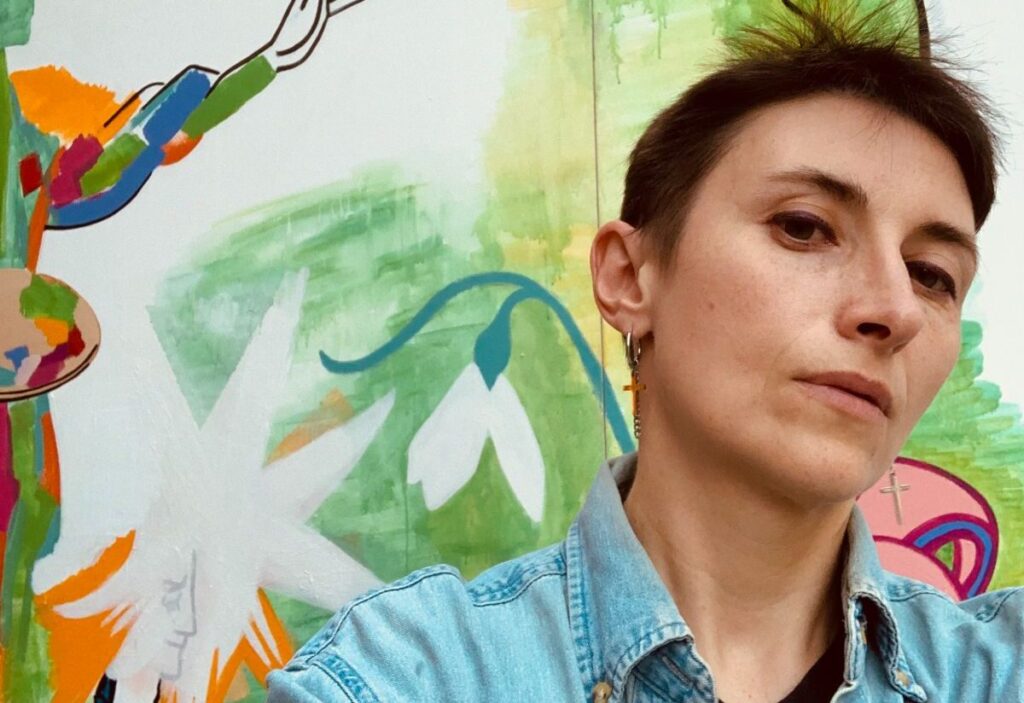09.11.2022 - 17:47
The name of Russian artist Victoria Lomasko was announced today in Barcelona as recipient of the PEN Català Free Voice award. The award reaches its 13th edition this year, coinciding with the 100 anniversary of the Catalan branch of PEN International. This is why there is an exhibition at Barcelona’s Palau Robert, where today at 7 pm there will be a recital of Ukrainian poets (Andríi Antonovskyi, Catalina Girona and Sofia Kostyukevych), leaving as always an empty chair to remember the persecuted writers, as the new president of PEN Català, Laura Huerga, explained.
Miquel Àngel Llauger, poet and translator, and head of PEN’s persecuted writers committee, was in charge of announcing the award and talk about the importance of Victoria Lomasko. The press conference had to be held online because the Russian artist couldn’t travel to Barcelona to collect the award due to visa problems. Lomasko fled Russia last 5 March and currently lives in Germany.
Llauger explained that Victoria Lomasko deserves the Free Voice award because she has suffered repression, because she is out of Russia, her country, and she is so not by choice, and she does not know if she will be able to return there, and especially because she has shown courage with her art. “This award also wants to be a denunciation of European asylum policy.” Lomasko has been forced to file a complaint, but her natural vocation is to be an artist and that’s enough, Llauger clarified. Therefore, she also deserves the award because she has taken on a civic obligation that she was not looking for and because being an artist is a privilege that she is being currently denied: “Journalists always ask me about Putin, not about my art”, Lomasko explained.
Lomasko’s Catalan publisher, Matilde Martínez Sallés, thanked the award but also regretted that her last books now have an echo due to the current political situation, although Godall Edicions started publishing her long before the Ukrainian war. “Victoria Lomasko’s work is important above political circumstances.” She also emphasized that this award is a show of solidarity with people who do not have a passport, and that it will serve to spread Victoria Lomasko’s speech against Putin’s dictatorship.
“As a Russian person, it is very important for me to receive this award”, thanked Lomasko, “because not everyone in the world is ready to do anything good for someone who is Russian today, and many people have turned their backs on the Russian people.” “Russians and Putin are not the same”, she emphasized. Lomasko wanted to thank the support of Matilde Martínez Sallés at all times, and her other editors in other languages, and all the people who see her as an artist and not as a Russian. “I can’t change my passport.”
“I try to transform my traumas, which are those of a person who has been oppressed, into art. I belong to a generation that remembers every detail of the Soviet regime. My father was a painter for the Soviet regime and we had a house full of portraits of Stalin, but he hated the Soviet regime. I grew up looking for another path, a path outside official art. Living in Russia doesn’t help you make great art, but you can take a piece of paper, draw something small on it and then put it in your pocket and maybe flee the country.” Lomasko also explained that she had to work in the West because her texts were not published in Russia. Then she returned to Russia and always ran the risk of being arrested for her art. There were very few artists who opposed Putin before 24 February, when war was declared in Ukraine.
“Now I’m in Italy, in Brescia, preparing an exhibition of my 150 pieces that will also be called The Last Soviet Artist. And I wrote an essay about my exile, because I don’t just feel like an artist, I also feel like a writer. And sometimes I need to write before I can draw.” According to Lomasko, art is a magical door to a wonderful world, art can change people, and she wants to be only an artist, she wants to have this privilege that artists from other countries that are not in conflict have.
“I don’t want to go back to my country as it is now. I escaped from Russia. That country is no longer my homeland. I miss my family, my friends, my apartment, my neighbors, nature, but I am not ready to go back to a country where they are willing to eliminate my works and even myself. I consider myself an international artist and this is how I think when I make my art.” Now Lomasko is in Italy, in Brescia, and she will return to Germany, but she constantly struggles to obtain visas, moving from country to country, and hoping to be able to return to Barcelona, where she came in September to present a book.
“In every Russian family there are people from Ukraine. In every Ukrainian family there are people from Russia. There are Russian people who help Ukrainians and who contribute to mitigating this hatred against Russians. We are living in a very dark period. For Ukrainians it is a tragedy, the end of the world. For Russians it is very hard, because the war also destroys our country. But I want to think that all of this will be a lesson on how to build the global world in the future”. These were the parting words of Victoria Lomasko, the Russian and international graphic artist, now in exile.


